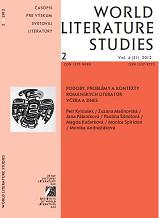Mýtus Buenos Aires v diele J. L. Borgesa
The Myth of Buenos Aires in the work of J. L. Borges
Author(s): Paulína ŠišmišováSubject(s): Literary Texts
Published by: Ústav svetovej literatúry, Slovenská akadémia vied
Keywords: Buenos Aires. Myth. Compadrito. Milonga. J. L. Borges. Urban Creolism.
Summary/Abstract: The author explores the forming of the myth of Buenos Aires and its modern symbols (compadrito, milonga and tango) in the work of the Argentinean writer J. L. Borges. In the first part she points out the influences that formed Borges’s work with regard to this aspect (the Spanish avant-garde poet Cansinos Asséns and the Argentinean folk poet Evaristo Carriego) and identifies the differences between Borges’s urban poetics and the poetics of flânerie. The second part introduces Borges’s poetic programme of “urban creolism” that brought to literature the motif of suburbs as a place where tradition encounters modernity and the motif of compadrito, the urban “descendant” of gauchos. She indicates that this programme also involved mythologisation of Buenos Aires that resulted from a mix of Borges’s memories, imagination and historical facts. The third part analyses the cult of courage embodied in compadrito, the protagonist of milongas and tangos. She also affirms that in the course of time the exclusively Argentinean themes in Borges’s writings acquire a universal philosophical dimension and thus Buenos Aires become dreamlike and labyrinthic. These observations are substantiated with fragments of Borges’s poetry and prose.
Journal: World Literature Studies
- Issue Year: IV/2012
- Issue No: 2
- Page Range: 41-52
- Page Count: 12
- Language: Slovak

